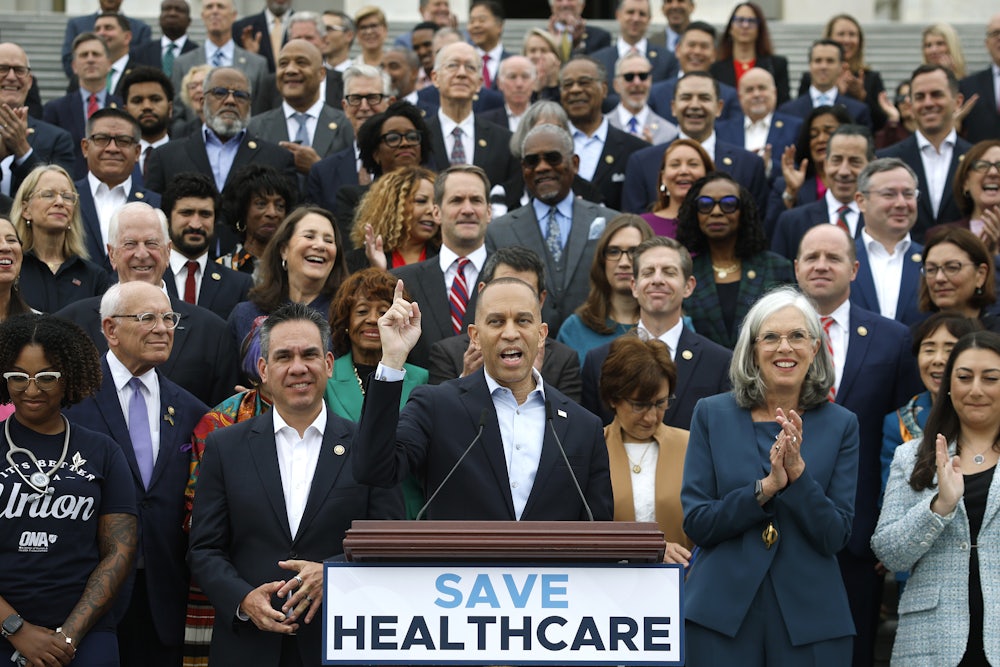For months, I’ve been calling out congressional Democrats for being weak and timid and not actually standing up to President Trump. So I guess I should be happy that they are leaning into this government shutdown. But actually, I’m feeling queasy. While I’m glad to see an angrier and feistier party, I’m skeptical of the particular fight they have chosen and worry it will result in at best a very narrow win—or maybe even a defeat.
The Democrats’ approach to this funding dispute represents a fusion between two competing camps in the party, “Team Normal” and “Team Abnormal,” as Vox’s Zack Beauchamp described them in a smart recent piece. Team Normal essentially thinks that the best way to weaken Trump is to attack him like you would any other president. So people in this camp want to focus on issues that polls show are top of mind for most Americans (like the cost of living) and/or where Democratic positions are much more popular than Republican ones (health care). I would put House Minority Leader Hakeem Jeffries, Senate Minority Leader Charles Schumer, the vast majority of Democratic senators, and most of the party’s pollsters and strategists in this Normal group.
In contrast, Team Abnormal argues that because Trump is so authoritarian, Democrats can’t afford to rely solely on traditional tactics. They must be ultra-aggressive in contesting Trump, even in ways that might in some cases annoy average Americans or seem over-the-top. I would put Governors JB Pritzker and Gavin Newsom, the group Indivisible, House members in the Congressional Progressive Caucus, and most party activists in this bloc. Me too.
When Senate Democrats took the Normal approach in March and provided the necessary votes to pass a government funding bill, those in the Abnormal camp were furious, with Indivisible calling for Schumer to resign. So this time, Democratic Party leaders decided to adopt both strategies. They are doing something Abnormal—not ducking a government shutdown. But their top priority and main argument in the fight is a Normal one—extending Obamacare subsidies.
There are three advantages to this approach. First and most importantly, it unifies the party. Progressives and activists get the battle with Trump they wanted. Center-left congressional Democrats can embrace a fight on a popular, safe issue like health care funding. They would probably not sign off on a shutdown to stop the administration’s use of Immigration and Customs Enforcement and the National Guard to terrorize cities, for example.
Second, Democrats making the defense of Obamacare subsidies a central cause is not only good policy but potentially good politics. People who earn enough so that they aren’t eligible for Medicaid but don’t have jobs with good health care are exactly the kinds of working-class Americans who have defected from the party in recent elections. The Democrats are not defending wealthy people on the coast, nor are they defending people without jobs—two familiar conservative tropes that sadly many voters buy into. Obamacare subsidies go to people who are putting in their own money to pay for health care but still need some help.
“I’m for the rights of immigrants. I’m for LGBTQ equality. But those voters that we need to win, that may disagree with me some on those issues, I want to make sure the Democratic Party wins on the economy and on the day-to-day issues that matter in a voter’s life the most,” Congressional Progressive Caucus Chair Representative Greg Casar told me in a recent episode of TNR’s Right Now, the show I host, as he argued that the Democrats must be an economics-first party.
Third, extending Obamacare subsidies is a practical, achievable demand. In an interview this week on Right Now, I pressed Representative Melanie Stansbury on why Democrats weren’t making this fight about the National Guard, ICE, Trump refusing to spend money Congress has already appropriated, or other “democracy” issues. She rightly pointed out both that the administration is already violating existing laws in many cases and that many of Trump’s worst acts are outside of the purview of congressional funding. Congress doesn’t have much ability to influence ICE policies, but it can fully fund Obamacare.
“The question about the misappropriation of funds, the cutting of programs, the federal firings—all of those things are already illegal. So we can insist that they make them illegal again in these appropriations bills, but it doesn’t change the dynamic,” says Stansbury. She added, “We are fighting back. But you’ve got to fight back in the right venue.”
All that said, there are many problems with the Democrats embracing a health care–focused shutdown. I worry this Obamacare demand is almost too small to sustain an extended shutdown. (My colleague Michael Tomasky made a similar argument last month.) The overwhelming majority of Americans get health care through their jobs, Medicare, or Medicaid. They just aren’t that invested in the comparatively small population on the Obamacare exchanges. If the Trump administration starts laying off large numbers of federal workers, closing national parks, and taking other steps to make this shutdown painful, while blaming Democrats for that pain, I am not sure defending Obamacare subsidies will be a strong enough message for the broader public to continue a shutdown.
Second, my sense is that those on Team Normal, particularly moderate Democratic senators, still basically believe in that strategy and won’t commit to a shutdown for too long. There is a reasonable argument that the Democratic Party has executed the Normal strategy most of this year and it’s working, at least electorally: Trump’s poll numbers are terrible; Democrats are doing very well in special elections and are clear favorites to win the midterms. An extended shutdown risks those advantages.
I should note that I don’t agree with this argument. In my view, Trump is unpopular because of his actions, not because of a combination of his actions and Democrats saying poll-tested blah all year long. But it doesn’t matter what I think. Democrats can sustain a shutdown only if the party stands unified, and I am very dubious that the people on Team Normal will stay on board if this impasse extends more than a few days.
Finally, let’s say Democrats stay unified, the public really cares about Obamacare subsidies, and Republicans cave and agree to increase them. Blocking Obamacare subsidies is bad, but Trump has done 10 worse things this week alone. If congressional Democrats use the only real leverage they have against the most authoritarian American president in recent times to reduce health premiums for 22 million people and nothing really else, that’s not much of a victory.
I don’t know exactly how Democrats could use this funding debate to stop Trump from being a dictator, but I wish they were trying as hard as possible. They are not. They seem more invested in coming out ahead in a narrow policy dispute and maintaining good poll numbers than engaging and winning the much larger fight over democracy and freedom that is happening in the United States in 2025.
“This, then, should be the Democratic objective: not to extract policy concessions or win news cycles, which never works, but to begin building a larger social ethos of resistance to authoritarianism,” Beauchamp wrote this week. “Unless and until Democratic leadership recognizes this bigger picture, and adjusts their tactics accordingly, their shutdown strategy will almost certainly be doomed to failure.”
I’m not quite that pessimistic. My position is more nervousness and anxiety. I really want a fighting Democratic Party. I also want Americans to be able to pay for their health care. I just worry those goals are being conflated. The Democrats are again ducking a big opportunity to truly fight authoritarianism in the United States.
Perhaps the best way to win the war is to win a lot of smaller battles. But I’m skeptical. We’ve been watching Democrats pursue versions of this strategy for 10 years, and it’s resulted in Donald Trump being the most dominant political figure in the U.S. in decades.






